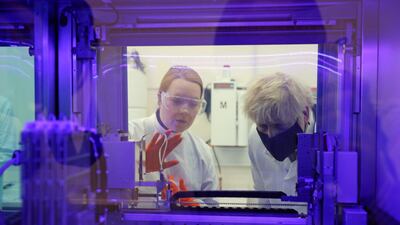Britain and the EU could become science and tech competitors as both sides strive for self-reliance after Brexit, raising doubts over defence and security co-operation, experts have warned.
The UK's landmark defence review said last month that Britain should seek to be a "science and tech superpower" by 2030 and elevate cyber power to "the highest importance as a component of our national security".
But the EU is also seeking “strategic autonomy” in its new trade policy – potentially putting London and Brussels in competition as Europe tries to build up key industries within its borders.
“What I see is a lot of activity going on in these strategic, industrial areas, these technological areas,” said Sarah Raine, a fellow for geopolitics and strategy at the International Institute for Strategic Studies (IISS).
“A lot of it though is in parallel rather than in co-ordination, and quite a bit of it is going to be in competition, frankly,” she said at an IISS event on Wednesday.
Ms Raine highlighted the example of the EU's efforts to break into the iron lithium batteries market, even as Britain pushes forward with its own initiatives to "position itself in the global battery market".
The EU has also set out plans to capture 20 per cent of the global market in semiconductors by 2030 and to have its first quantum computer by 2025, said Nick Crawford, a research associate at the IISS.
“Open strategic autonomy” was one of the central themes in the European Commission’s new trade strategy which was published earlier this year.
"But at the moment “the emphasis seems to be placed slightly more on the 'autonomy' side than the ‘open’ side, building up industrial capacity in Europe in various strategic industries”, said Mr Crawford.
“Similarly, in the [British] Integrated Review, the UK emphasised the importance of bolstering a British science and technology base and strengthening supply chains in critical and emerging technologies,” he said.
The UK review emphasised Britain’s alliance with the United States, its membership of Nato and its ambitions for a “tilt” towards the Indo-Pacific.
But it scarcely mentioned co-operation with the EU, and its relationship with the bloc has been strained further in recent months by tensions over trade and vaccines.
Britain has raced ahead of the EU in vaccinating its population, prompting complaints from Brussels that the UK is getting preferential access to supplies.
IISS analysts said the current tensions were not simply “momentary unhappiness” but could undermine defence co-operation between Britain and the EU.
Bastian Giegerich, the IISS’s director of defence and military analysis, said “there seems to be a misunderstanding” about the idea of strategic autonomy.
“The important bit is to always be strategic and sometimes that means you need to be autonomous,” he said.
“People are getting the wrong way round – they always want to be autonomous and think that makes them strategic.
“That is obviously the basic misconception, both on the British side – you can think of Brexit as one big play for strategic autonomy, of course – and on the EU side.
“As long as that isn’t solved, I think it’ll be very hard to make progress on any of this.”
Ms Raine said the UK and EU had “competitive” interests in their respective trade plans.
“There’s going to be a lot on the broader trade plate and the EU is going to persistently butt into it because of problems with the [Brexit agreement] and because of realities of closest and strongest trading partners,” she said.
“The reality is that the last few years of uncertainty as to whether or not there would be a deal has already damaged co-operation in strategic industries.
“I don’t think the picture looks particularly great at the moment.”
Fenella McGerty, a senior IISS fellow for defence economics, said the UK was seeking to provide key capabilities “wholly on-shore”.
“It’s similar to the approach taken on the continent where there are those key areas that Germany, France, they’re keen to protect domestically,” she said.
Ms McGerty said it was “idealistic” to think that countries would work together to achieve the most efficient production.
“It’s quite idealistic, it depends on countries seeking to collaborate and co-operate on programmes, but then again you have the more negative approach,” she said.


